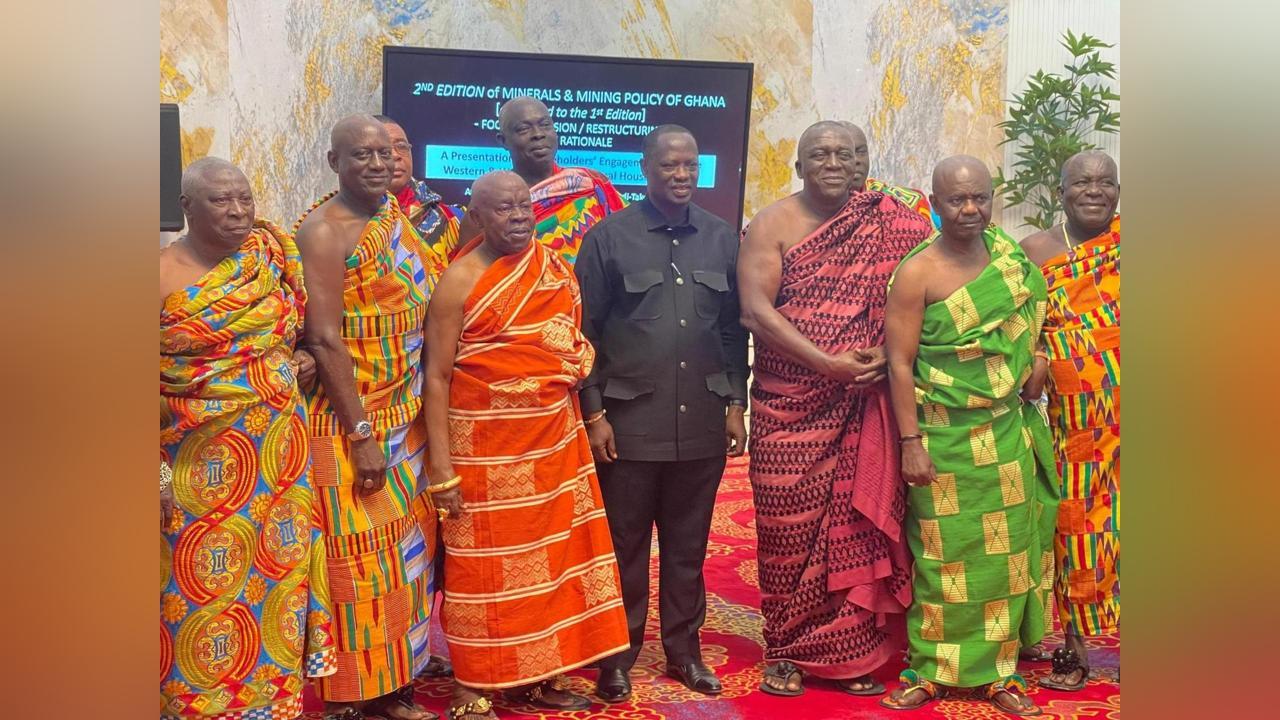Africa-Press – Ghana. The Minerals Commission, under the auspices of the Ministry of Lands and Natural Resources, has engaged members of the Western and Western North Regional House of Chiefs to solicit their inputs to review and amend Ghana’s Minerals and Mining Act, 2006 (Act 703).
The engagement, held at Essipong in the Sekondi-Takoradi Metropolis, brought together the paramount chiefs and traditional leaders from the two regions to also deliberate on processes to review the 2014 Minerals and Mining Policy.
It formed part of ongoing nationwide stakeholder consultations being undertaken to seek public inputs to reform the country’s minerals and mining legal regime to reflect emerging global trends.
Mr Emmanuel Armah-Kofi Buah, the Minister for Lands and Natural Resources, during the opening of the event, said the Minerals and Mining Act, 2006 (Act 703) had been in existence for more than a decade, and that a lot had changed over time which had necessitated the move to amend the law.
He stated that new technologies, issues of climate change and transition minerals, new mining practices and experiences, and other emerging global trends as well as challenges from the implementation of the current Act over the years required the mining regulations to be tweaked to meet contemporary standards.
“One of the things that must happen is that, there must be a complete overhaul of the structures of the law and policy because a lot in terms of changes in technology, international laws, and even the way we do things have changed over the past decade.
“…But most importantly, the role of the chiefs and traditional authorities must change in the way we extract resources to ensure that indeed the chiefs are the custodians of lands,” the Minister said.
Mr Buah noted that the whole process was also to amend the law to strengthen and build the capacity of mining communities, saying; “We want to make sure that companies operating within those areas are not just doing charity, but they are obligated to help transform the communities.”
He said the government was making conscious efforts to empower Ghanaians through the amendments of the law to ensure they led large scale mining activities to help build a resilient and sustainable mining sector to develop the country.
The Minister stated that the amendment would also include giving legal backing to cooperative mining scheme as a measure to solve the illegal mining (galamsey) menace in forest reserves and water bodies.
He said the cooperative mining had learnt all the lessons from past mining schemes to ensure its success.
Mr Buah appealed to the chiefs to make valuable contributions, saying their inputs would be very critical in making the changes required to help shape the processes in managing the country’s minerals resources for sustainable development for all.
Ogyeahoho Yaw Gyebi II, the Paramount Chief of Sefwi Anhwiaso Traditional Area, and President of the National House of Chiefs, commended the Ministry of Lands and Natural Resources for involving traditional authorities in the reforms of the minerals and mining legal regime.
He said: “When you go through the Act and indeed all the regulations, Nananom are not involved, so I am happy that this time around Nananom have been regarded for their comments.”
Nana Kobina Nketsia V, Paramount Chief of Essikado Traditional Area, and President of Western Regional House of Chiefs, said it was time Ghana nationalised its mineral resources, and that the engagement was crucial in bringing a change to the minerals and mining legal regime to the benefits of the citizenry.
For More News And Analysis About Ghana Follow Africa-Press







